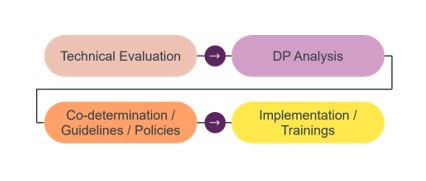Quick HR Guide: Key considerations for Implementing AI to your German workforce
In this Quick HR Guide, employment experts Catharina Klumpp and Benjamin Karcher provide a detailed overview the key considerations companies should observe when implementing AI tools across their German workforce.
These days we are extremely busy advising clients on the implementation of AI tools and systems as well as navigating negotiations with works councils on that topic.
This checklist shall give a brief overview on what to consider when implementing AI from a German employment law angle. Undisputedly, AI has a massive impact on the work environment and should be introduced in a conscious way.
Alongside significant opportunities and game-changing technologies, there are potential risks, including the abusive use of AI, non-compliance with laws or intellectual property rights, and discriminatory decisions made by AI tools. Amongst others, Employers can be liable under the German General Equal Treatment Act if they have programmed or used AI systems inadequately, used an inadequate data basis or formula or do not carry out regular quality checks.
For the liability it does not matter if the tools are external or internal and who (technically) was responsible for the error or discrimination practice. Additionally, total monitoring of employees’ is forbidden in Germany. Various further restrictions from the GDPR and the AI Act apply and must be considered. Depending on the concrete tools and setup, co-determination rights of the works councils must be observed and detailed works agreements are to be negotiated with the employee representatives.
To ensure things do not get out of control, companies must draft detailed and binding policies and guidelines. The following questions should be asked before any AI use is permitted:
- What tool shall be implemented and what data does it use?
- Who shall use the tool?
- What input? What output?
- For what is the tool used?
- Is there a works council?
Checklist AI Implementation
- Instruction or prohibition of AI use
The employer can prohibit the use of AI as work equipment as well as instruct the use AI tools for fulfilling obligations within the scope of their right of direction under Section 106 GewO (observe any conflicting professional law, e.g. for doctors).
- Inventory
Before creating binding regulations and compliance systems for the use of AI it is crucial to have a full and deep understanding of what tools, algorithms and systems there are in place, and which shall be implemented when. Already due to the AI Act it is required to undertake a solid inventory to ensure compliance with the obligations of companies using (or developing) AI.
- Process & Stakeholders
A common process in practice is as follows:

- Rights of the Economic Committee
The Economic Committee might have the right to be informed about the introduction of AI tools as "new working methods".
- Rights of the Works Council
If a Works Council exists, the use of AI tools can trigger information, consultation, and co-determination rights. Works councils themselves can consult experts and as a rule employee representatives must be taken along in the journey towards new technologies to ensure success. Transparency increases trust. For most technical tools, works councils must agree to the use and have a right to stop implementation before an agreement is found or replaced by a conciliation board decision. Data protection regulations must be observed!
- Introduction of rules of conduct regarding the use of AI applications
Firstly, technical understanding of each tool is key. Thereupon, companies must decide what use and data input shall be allowed and how to deal with outputs. If no regulations exist yet, the personal, local, and…




